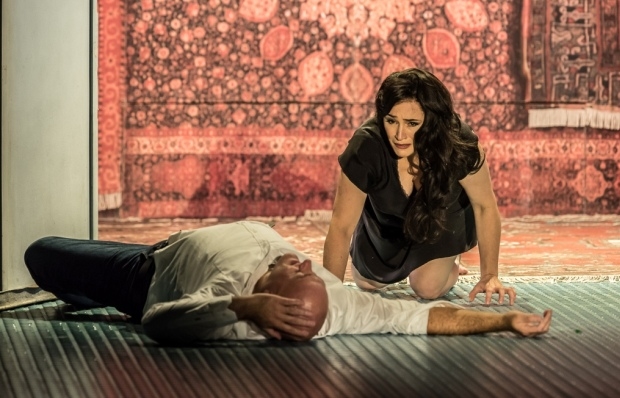Lady Macbeth of Mtsensk (London Coliseum)

© Clive Barda
Shame about the production.
Who’s to say whether the new directorate at English National Opera would have sanctioned importing Dmitri Tcherniakov‘s flaky Deutsche Oper staging, already a known quantity when former artistic director John Berry plumped for it as a replacement for David Pountney‘s admired version? But they can have few quibbles about the cast that’s been assembled to put it across.
Patricia Racette is sensational as Katerina, the morally challenged wife who makes Lizzie Borden seem like Heidi. Tcherniakov paints her as a sociopath who withdraws whenever possible into a nest of self-absorption (expressed in physical terms by a carpet-lined box where she lets her emotional hair down), but the great American soprano contributes a three-dimensional humanity all her own. Indeed, all the singers do an excellent job of rising above the production; she, though, is a star.
Racette’s interpretational subtlety is as dazzling as her rock-solid vocal command. She dominates the unravelling tale, honours to the hilt the title’s ironic sobriquet and invests her big, chromatic soliloquy with an overwhelming sense of thwarted languor. We are never allowed to forget that Katerina is victim first, multiple murderer second.
Our heroine, unhappily married into a business family, falls head over heels in lust with burly new employee Sergei (tenor John Daszak in sonorous form) and so finds herself not so much compelled as propelled to bump off anyone who stands in her way. Body count: four.
'Wigglesworth’s personal triumph'
The score that Shostakovich produced to spin this melodramatic yarn into an opera is built upon rampant extremes: deafening horror, unquiet calm, humorous pastiche, wicked parody. When things get sexy, the brass get brassy. Lady Macbeth of Mtsensk is a director’s toybox; so why does Tcherniakov mute the action so much? His decision to set it in a modern-day logistics warehouse, complete with fork-lift truck and computer terminals, clips the opera’s gothic wings.
His vision is awash with aesthetic paradoxes. It’s as if he chose to set himself hurdles then found himself incapable of jumping them. There’s one scene of chaste nudity, yet when it comes to rumpy-pumpy everyone keeps their pants on – an anomaly that’s as distracting as it is anatomically implausible. First rule of sex scenes: if you can’t show it, suggest it. And from a technical standpoint act three is a disaster, with the most inept crowd management the Coliseum has seen since Sally Potter’s Carmen. Why bring on a gaggle of policemen if they don’t create a picture? Why rustle up a fully-staged wedding but resort to mime for an inconveniently plot-necessary cellar? The list goes on.
The opera’s final act shuns Shostakovich’s imagined river bank in favour of a six-by-six prison cell, a relocation that works well until the very end of the opera when Tcherniakov subverts the composer-librettist’s intentions. Not, though, before Clare Presland has made her scene-stealing contribution as a shamelessly opportunistic Sonyetka, the girl who fatally turns Sergei’s eye. She, together with equally committed cameos from Peter Hoare, Rosie Aldridge and an unseen Matthew Best, plus an expanded ENO Chorus in fine voice, helps turn Wigglesworth’s personal triumph into an unforgettable company achievement. Aurally speaking.










